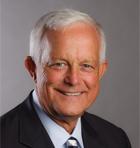
Professor Kevin Sharer, former CEO of Amgen, makes the case for developing an explicit strategy for your time in school.
Steve Hind, editor of The Harbus, wrote in the last edition to suggest that you think purposefully about the choices you make at HBS with an eye towards social choices in general and some EC and RC specific choices. Everyone has a strategy whether it is explicit or implicit. Implicit strategies can only be understood by assessing action and choices after the fact. A surprising number of businesses seem to favor this ad hoc approach and in general it leads to suboptimal outcomes or complete failure. The same is true for people. The point is, develop a strategy. This is easy to say but not always so easy to do. Moreover, as we all know, strategy implementation in the face of a dynamic environment, challenges from opponents, and the limitations of capability and resource is 99% of the challenge to the strategy’s 1%. But that 1% is vitally important. So, how to even begin and then actually implement your strategy with enough flexibility and resilience to adapt during your time at HBS?
Begin by dedicating enough time with enough deep self-reflection to have a strategy that is authentically yours– not your parents’, not to impress your friends, and not something you write down but have no intention of actually implementing. Make sure the strategy addresses personal, social, academic, professional, and experiential elements. Finally, make sure there is enough granularity in time based milestones to both define what good looks like for you and hold yourself truly accountable. A loose tight approach is best, which means enough specificity to be real but not so voluminous or inflexible as to prevent the adjustments which inevitably will be necessary. This is the right time of year to do this if you have not already done so. Even if you think you have it nailed, take another look with lenses as objective and detached as you can muster. RC’s will be amazed how fast the essentially twenty months left pass and the EC’s will be stunned to wake up in eight months and graduate. Tempus fugit!
The first and most important step is to figure out your over-arching strategic objective. Some examples might be: “I am here to achieve at the highest level academically”; “I am here to have fun first and graduate as efficiently as possible second”; “I am here to figure out my life”; “I am here to grow to form a foundation to become the best person I can be”; “I am here to build my network”; and finally “I am here to change my career arc and get a great job in a new-to-me industry”. You might say, wait a minute, these objectives are not mutually exclusive and I can blend them. Fair enough, but my experience and observation says that without a clear strategic objective, people and firms tend to find themselves in the “without an objective, any outcome is possible and will do” trap. Each one of the above strategic objective statements is credible and each is in evidence today at HBS. You may think of a few more. The only hard and fast objective I would favor is to graduate, even though as the last Harbus featured there are some who pass on or defer graduating on time or even at all. Think Bill Gates leaving Harvard College early as the dream outcome- pretty long odds.
One of the strategies seems to me most likely to have the biggest life payoff, and that is the “grow to build the best foundation” choice. You will never be in an environment like HBS again in resources, freedom of choice, quality and range of people, breadth of experience, amount of help in all aspects of life, responsibility and time fundamentally for yourself, facilities, and the list goes on. Take full advantage. A fundamental truth is that growth most effectively happens outside of your comfort zone.
How can you plan for and realize maximum positive growth? First, realize strategy is about choice and you cannot literally do it all. You do not have the time, capability, energy, or the retentive abilities to pursue a truly omnivorous path. Many try, but so much is superficial or just does not last. Perhaps framing growth in categories could help. Grow as a person. Grow as a potential business leader. Grow in awareness of the world at large. Grow in the number, type, and quality of people you know. Grow in accomplishment and expertise.
A few words about some of the objectives. The single most important personal growth objective to develop true, broad, and deep self-knowledge coupled with understanding how others see you. In my experience, more senior executives struggle and even fail due to insufficient self-knowledge than any other cause. Be brave and confident you are good and have potential. Resolve to get even better. For you to move forward in this dimension you must take risks and occasionally suffer discomfort. It is worth it as you more deeply and completely understand yourself.
Social growth, experience, and expanding your network are intertwined. Our tendency is to spend time in our comfort zone which means being with people like us. Some of this is fun, good, and valuable, but growth will happen by exposing yourself to and trying to really get to know people who are different. The high school/college vibe of partying and large scale often superficial events will happen, but make that time a minimum. Fewer, deeper, lasting connections will serve you best. The thought that your future will be importantly shaped by your HBS network is received wisdom here, but I question that premise. Network building is lifelong, and my bet is that your key networks are ahead of you. So, don’t worry so much about a network; but focus on the real relationships that can last.
A word about learning. You will discuss about 400 or 500 cases during your twenty months. Frameworks, toolkits, and takeaways will be sought and offered for most cases. Frameworks and toolkits have their place, but they alone are insufficient. Who can carry around a 1000 plus bag of frameworks, takeaways, and insights and hope to apply them? Think fewer, bigger picture ideas. If you have a familiarity with the language and concepts of business, can do rudimentary finance, and have ten or so big picture and enduringly important big ideas firmly planted you will be well served.
A large company successful HBS grad CEO once said he remembered “what’s the weather?” as one of these ideas which meant always think about context and dynamics. Your core learning objective should be to develop the ability to properly analyze a complex situation, describe it succinctly, and do the analysis to frame and ultimately choose and implement a course of action. Implementation overwhelms analysis in importance and challenge. HBS will naturally help on analysis and formulation, but you need to push hard and take initiative to come away with an implementation capability.
One last thought. Some of you will find your life partners here and hopefully form a wonderful foundation for you both. Make this a happy, unexpected blessing and not part of your plan. Some things are best left to chance and the heart, and do not yield to strategy.
PREPARING FOR YOUR HBS INTERVIEW? GET OUR POPULAR HARBUS MBA ADMISSIONS & INTERVIEW GUIDE HERE. it’s full of coveted advice & hundreds of real interview questions that admitted students were asked themselves.
APPLYING TO HBS? THE UPDATED, POPULAR HARBUS MBA ESSAY GUIDE 2015 IS AVAILABLE HERE. IT’S A MUST-HAVE FOR ALL B-SCHOOL APPLICANts!



